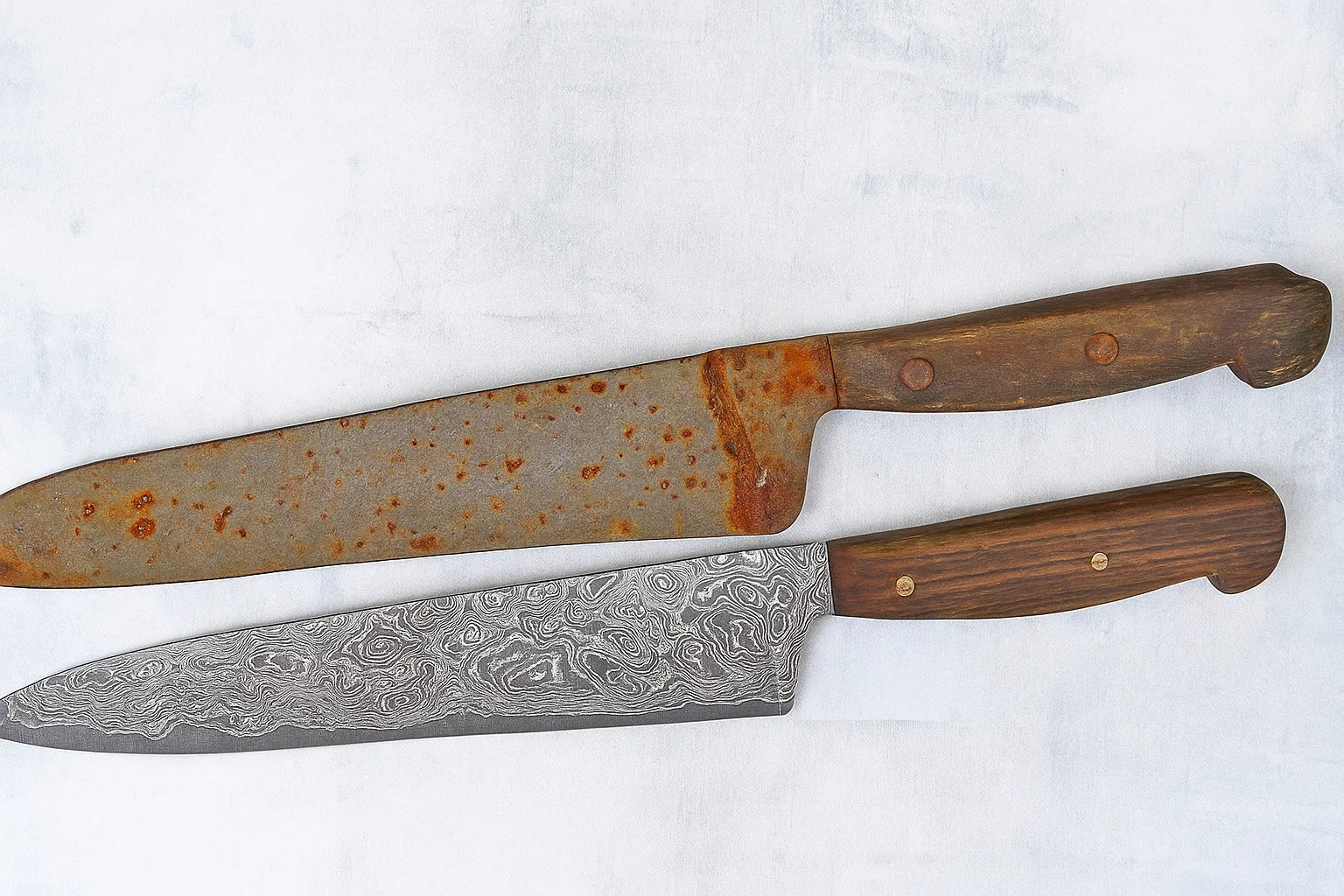Your Cart is Empty
FREE SHIPPING FOR USA

Damascus steel knives are renowned for their beauty, strength, and unique wave-like patterns. However, due to the high-carbon content used in forging many Damascus blades, they are more prone to rust compared to stainless steel. If you've noticed brown or orange spots on your prized Damascus knife, you're not alone. This guide will help you understand what causes rust on Damascus knives and how to safely remove and prevent it.
Most authentic Damascus knives are made with high-carbon steel, which offers excellent edge retention and sharpness. However, carbon steel reacts with moisture and oxygen, leading to oxidation (rust) if not properly maintained.
Leaving your knife wet or storing it in a damp environment is a major contributor to rust. Even small droplets of water can lead to rusting if left on the blade for extended periods.
Slicing acidic ingredients such as tomatoes, lemons, or vinegar-based foods without cleaning the blade afterward can speed up corrosion and discoloration.
Storing the knife in a leather sheath or drawer without ventilation traps humidity around the blade, creating a perfect breeding ground for rust.
Without regular oiling, especially after cleaning, the blade remains unprotected against environmental factors that cause rust.
If rust has already appeared on your Damascus knife, don’t panic. Here are effective and safe ways to remove it without damaging the blade’s pattern:
Mix baking soda with water to form a paste.
Apply it to the rusted area and gently scrub using a soft toothbrush or cloth.
Rinse and dry thoroughly.
Soak a cloth in white vinegar and wrap it around the rusted part.
Let it sit for 15–30 minutes.
Gently scrub with a soft brush, rinse, and dry.
Use a rust eraser made specifically for knives.
Gently rub it in one direction only to avoid scratching the pattern.
Wipe and oil the blade afterward.
Use ultra-fine #0000 steel wool very gently.
Always apply light pressure and follow the grain of the blade.
Use as a last resort, as this can potentially damage the etching.
Never use harsh chemicals like bleach or heavy abrasives.
Always test on a small area first to ensure the blade’s pattern remains intact.
After cleaning, immediately apply food-safe oil to prevent new rust.
Always hand-wash your knife with mild soap and warm water. Avoid dishwashers completely.
Use a microfiber towel or soft cloth to dry the knife completely before storing.
Use food-grade mineral oil or camellia oil to create a protective layer on the blade. Reapply every few weeks depending on usage.
Store your Damascus knife in a dry place:
Magnetic strip (away from sinks)
Knife block
Ventilated knife roll or case
Avoid storing in leather sheaths for long periods without ventilation.
If you must cut acidic foods, wash the blade immediately afterward.
At Jun Knives, we recommend a regular cleaning and oiling routine for all our hand-forged Damascus knives. We use high-carbon layers for strength and sharpness, so extra care ensures they stay rust-free and beautiful for years.
Use camellia oil for both kitchen and outdoor knives.
Store in breathable environments.
Never leave knives wet or dirty overnight.
Rust on a Damascus knife can be frustrating, but with the right care, it's easy to remove and prevent. By understanding the causes and using the correct cleaning methods, your Damascus steel knife will remain a functional work of art. Treat it with care, and it will serve you for generations.